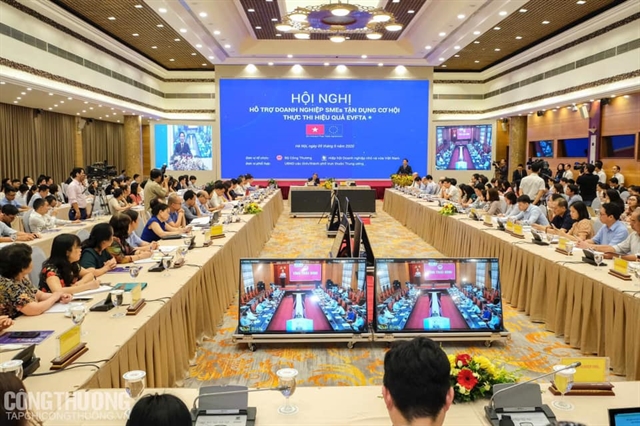[ad_1]

HÀ NỘI — The EU – Việt Nam Free Trade Agreement (EVFTA) is expected to bring both opportunities and challenges for businesses, especially small-and-medium sized enterprises (SMEs). This was why SMEs should fully understand the provisions of the EVFTA.
Minister of Industry and Trade Trần Tuấn Anh made the statement at a conference supporting SMEs in taking advantage of opportunities to effectively implement the EVFTA held in Hà Nội on Friday.
Anh said there were many issues the SME community should consider during the implementation of FTAs. For example, these include the ability to access and understand legal information, commitments in agreements as well as the implementation process.
According to the minister the EVFTA is a new generation FTA with the strongest commitments for the EU and Việt Nam on opening their markets, reforms of administrative procedures, institutions and policies. As soon as the agreement takes effect, EU commits to removing 85.6 per cent of tariffs, equal to 70.3 per cent of the country’s total export turnover to the EU.
Seven years after the EVFTA takes effect, the EU will remove 99.2 per cent of import taxes, or 99.7 per cent of export turnover from Việt Nam to the EU.
The remaining products will enjoy zero tax.
It means that nearly 100 per cent of Vietnamese goods exported to the EU will see import taxes abolished after a roadmap of seven years.
This creates big opportunities for local firms to expand their export markets to the EU and the same opportunities for European businesses.
Economists say the EVFTA has been expected to increase Việt Nam’s exports by 2.18 to 3.25 per cent in the 2019-23 period and 4.75 to 5.3 in the 2024-33 period.
However, the EVFTA will also bring challenges for SMEs, which account for 97 per cent of total businesses in the country. With 27 countries and a population of more than 450 million people, as well as per capita income of about US$36,000, the EU is also a demanding market, requiring high product quality. This is the biggest challenge for SMEs.
Nguyễn Văn Thân, chairman of the Việt Nam Association of Small and Medium Enterprises said the opportunity provided by the EVFTA would be huge, but the challenge for Vietnamese businesses in joining this agreement would not be small.
“The biggest challenge for SMEs is technical barriers. Vietnamese companies would have to face requirements of food hygiene and safety, epidemiological hygiene, codes of conduct, regulations on environmental protection, and origin of goods imported into the EU. The regulations on localisation rate will also cause many difficulties for businesses,” Thân said.
He said the competition with EU goods would also be a challenge for SMEs.
“When opening Việt Nam’s market for EU goods, it means that Vietnamese enterprises will have to accept fair competition with EU businesses. These are capitalised businesses with high quality goods, beautiful designs, and high competitiveness thanks to the benefits of EVFTA tax exemption,” he said. Therefore, Vietnamese businesses would be under great competitive pressure right at home.
“In addition, in terms of trade remedies, when tariff barriers are no longer an effective tool to protect businesses, import markets tend to apply anti-dumping and anti-subsidy or safeguarding measures to protect domestic production,” he said.
At the same time, when the economy is open under EVFTA commitments, production transition processes start to form. There will be a wave of investors from the EU flooding into the country, creating competition for labour resources in industries. Some industries therefore will lack workers.
The chairman said Vietnamese SMEs would also face difficulties of information shortage of the EU market as well as regulations on imported goods. Vietnamese enterprises had not yet been prepared with adequate knowledge and skills on exporting goods to the EU as well as lack of capital for production and business.
He proposed that the Government should accelerate administrative reforms while completing policies and institution to submit to the National Assembly for approval some important laws such as the Enterprise Law, Environment Protection Law and Labour Law to suit the EVFTA’s regulations. This would be a legal foundation for firms to effectively implement the EVFTA.
The Government should also organise training courses on the EVFTA to improve businesses’ awareness regarding the agreement.
The EVFTA is expected to be approved by the National Assembly on June 8. The agreement would take effect from July 2020. — VNS
[ad_2]
Source link
